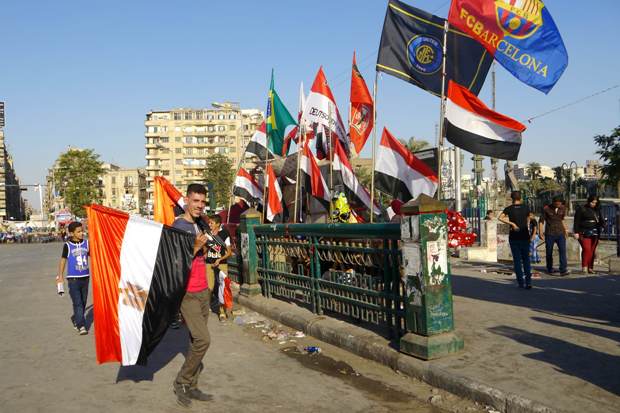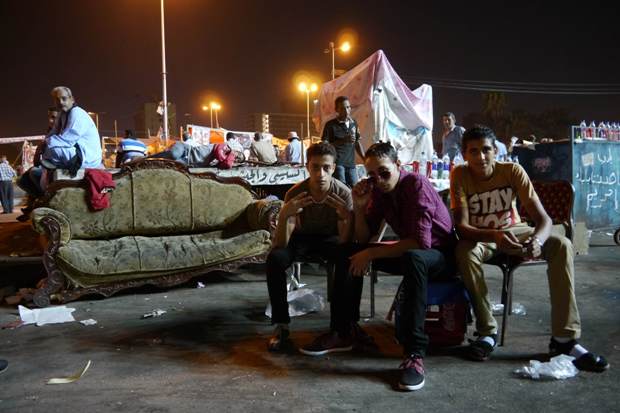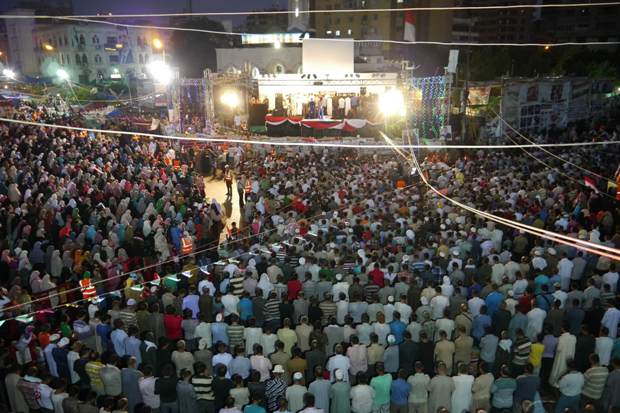In the pink and grey of daybreak the muezzin's call on the first morning of Eid rang out across Cairo, a city divided.
Although Cairene Muslims worshipped as one during the special dawn prayer Salat al-Eid on Thursday morning, marking the end of Ramadan, they did so from starkly different encampments: those who support the Tamarod (rebels) and interim government, and those bunkered behind barricades in Muslim Brotherhood sit ins at the Rabaa Al-Adewaya and Nahda squares.
It's a situation where those who know they hold all the cards are up against those whose faith tells them they do.
Alaa, a Downtown resident who asked for his full name not to be used, spent the morning in Tahrir Square.
"The people and the army joined together to pray, it was beautiful," he said, strolling past the barbed wire barricade — partly pushed open to allow traffic to enter again — and the two manned armoured personal carriers guarding this entrance to Tahrir square.
Alaa said after the prayer the civilians, numbering in the hundreds, embraced the soldiers and shouted slogans such as "the people and the army are one hand" and "we love you Sisi", referring to chief of the Armed Forces and defence minister General Abdel Fattah al-Sisi.
Alaa believes the Muslim Brotherhood sit ins must be broken up, even if the result is catastrophic bloodshed. It is a view shared by many Egyptians who are expecting a showdown after the Eid holiday ends on Saturday.
Tamarod member Omar Abou Zeid, 36, called the protest in Rabaa in Nasr City a "political hole, a terrorist hole" that would be solved by a "bloody shower" supported by the people.

"There is a good relationship between Egyptians and the military, they have a long history together, and the government has warned [the protestors in]Rabaa many times."
On Wednesday interim prime minister Hazem el-Beblawi said in a statement that the government hadn't wanted to take any action against the Brotherhood protesters during the month of Ramadan. In Tahrir, support for government action against the Brotherhood is both tacit and explicit.
Early on Thursday morning, on the stage in Tahrir square, a rapper sang anti-Brotherhood lyrics to a small crowd while enterprising salesmen sold banners proclaiming "Egypt is guarded by the army. The Egyptian people delegate the Egyptian army to fight terrorism".
The army is beginning to lose patience with the Brotherhood.
Egging on both the government and its suporters are headlines in state-owned newspapers such as "The last warning", "Government to Brotherhood: diplomacy is finished", and "Egypt rejects sermons from the American Satan", the last referring to the anger caused by Senator John McCain calling Morsi's removal a coup.
Interim President Adly Mansour said on Wednesday that international efforts to broker a peace between the supporters of former president Mohammed Morsi and the interim government had failed, and both Mansour and el-Beblawi warned Brotherhood supporters the protests wouldn't be tolerated for much longer.
"The train of the future has departed, and everyone must realise the moment and catch up with it, and whoever fails to realise this moment must take responsibility for their decision," Mansour said in an Eid broadcast.
"The decision agreed on by all to clear the sit-ins is final and irreversible," el-Beblawi said in his statement.
This message is not getting through to the protesters in Rabaa. Despite the barricades of pavers, ID and bag check and pat down at the entrances, and effigies of General Sisi and Mohamed Ibrahim, minister of the interior, hanged above the central square, the camp is packed full of children, families and cheerful men and women only too happy to explain their reasons for camping out on the hard tarmac.
Those reasons remove any doubts that a military dispersal will be bloody, because according to the protesters they have God and freedom on their side.
"This Eid we stay in Rabaa not for ourselves but for our country, for our freedom, for our children," said Mostafa Sherif, a cardiologist from a small town north of Cairo. "Even if the Egyptian media do not notice us, God will see us and that is enough," he added, calling the protest a "perfect worship".

Many of the protesters aren't supporters of the Brotherhood but see themselves as defenders of democracy. Aya Sahber, a 20-year-old veterinary student, is one such protester, and has been staying in the camp off and on for the last month.
Immaculate in a white hijab, she shouted over a crowd of laughing, opinionated women that she wasn't frightened of a military intervention. She didn't believe it would happen and her reasons for staying in Rabaa had changed.
"At first I came here to support Dr Morsi, but now I think some people steal my opinions and steal my country. They don't get my freedom."
Ahmed Abdul, 24, echoed her thoughts saying he wanted to send a message that no longer could a democratically elected president be removed without the people caring.
"We will stay here for years until Morsi comes back again. We will never leave the square until then."
As the night drew in on the camp at Rabaa, thousands of men crammed into the shanties and walkways to pray together while women dragged excitable children between row after row of worshippers.
Festive football matches were announced, a ping pong table was the source of boisterous ribbing, and a very permanent-looking child care centre, complete with trampolines, blow up bouncy castles and toys, fenced in dozens of children.

In stark contrast to this highly organised, wholesome family fun, the second night of Eid in Tahrir square and Downtown had a chaotic Mad Max air. Young men and boys, hyped up on hormones and nicotine, set off fireworks in the street and, sitting two to a motorbike, wheelied around the streets dodging taxis and pedestrians. Couples posed by the tanks at in the square entrances and vuvuzellas blared from every direction.
This Eid Egyptians celebrated, safe in the knowledge that one way or another, their team is the one that's going to win.
Donate To New Matilda
New Matilda is a small, independent media outlet. We survive through reader contributions, and never losing a lawsuit. If you got something from this article, giving something back helps us to continue speaking truth to power. Every little bit counts.



